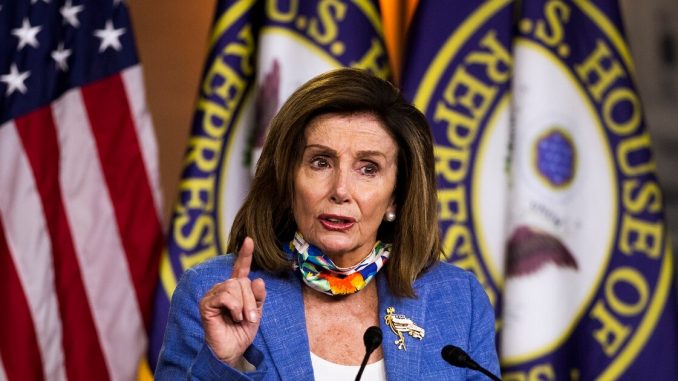
WASHINGTON — The two top Democrats in Congress said Thursday that any threats to U.S. troops must be pursued “relentlessly,” rebuking President Donald Trump after receiving a highly classified briefing about intelligence that Russia offered bounties for killing U.S. troops in Afghanistan.
House Speaker Nancy Pelosi and Senate Democratic leader Chuck Schumer said Trump, who has downplayed the threat, was “soft” on Russian President Vladimir Putin and distracted by less important issues. Trump has called reports of the intelligence assessments a “hoax” and has so far declined to address whether the U.S. has or will respond to Russia.
“Our armed forces would be better served if President Trump spent more time reading his daily briefing and less time planning military parades and defending relics of the Confederacy,” Pelosi and Schumer said in a joint statement.
Trump and the White House have repeatedly insisted that the president wasn’t originally briefed because the information was unverified, even though it’s rare for intelligence to be confirmed without a shadow of doubt before it is presented to senior government decision-makers. Officials have told The Associated Press and other news organizations that the information was included in one of the president’s written daily briefings last year and again this year.
/cloudfront-us-east-1.images.arcpublishing.com/mco/5GDJEQ26MJGCLC5OJGZCSGQTLY.jpg)
The criticism comes as Trump is working to change the narrative but has faced increasing pressure from lawmakers in Congress — including some Republicans — who have demanded more answers about the intelligence assessment. The president has repeatedly tweeted about protesters tearing down monuments to the Confederacy and on Thursday held a news conference to tout newly released numbers showing added jobs in the economy. He did not mention Russia.
Top intelligence officials, including CIA Director Gina Haspel and Director of National Intelligence John Ratcliffe, conducted the closed-door briefing for a group of lawmakers dubbed the “gang of eight” — Senate Majority Leader Mitch McConnell, House Speaker Nancy Pelosi and the top Republicans and Democrats on the two intelligence committees.
The group regularly receives classified briefings at the highest levels, and leaders rarely speak about them. Pelosi and Schumer did not address the substance of the meeting, and none of the other lawmakers leaving the meeting would comment on it.
In a news conference shortly afterward, Pelosi called for tougher sanctions on Russia. She said the white House has “put on a con” that there has to be 100 percent consensus on intelligence for it to rise to a presidential level.
Without sharing details, Pelosi said “it was a consequential level that the intelligence community should have brought it to us.”
The House intelligence committee was also scheduled to receive a briefing on the matter Thursday afternoon, according to a person familiar with that meeting who requested anonymity because it was not publicly disclosed.
/cloudfront-us-east-1.images.arcpublishing.com/mco/L6HFHEWIMJBUZK56BEEJBZ2WRQ.jpg)
The intelligence assessments that Russia offered bounties were first reported by The New York Times, then confirmed to The Associated Press by American intelligence officials and others with knowledge of the matter.
As the president has continued to downplay the intelligence, calling the reports “fake news” designed to damage him and the Republican Party, administration officials have insisted they have taken the assessment seriously. National security adviser Robert O’Brien said Wednesday that the CIA and Pentagon pursued the leads and briefed international allies. Secretary of State Mike Pompeo said the situation was handled “incredibly well” to ensure the safety of U.S. troops.
“We took this seriously, we handled it appropriately,” Pompeo said, without giving additional details. He said the administration receives intelligence about threats to Americans “every single day” and each is addressed.
/cloudfront-us-east-1.images.arcpublishing.com/mco/WNGC7CQVONENTLSQHZH5LQFQ6I.jpg)
Still, lawmakers have pressed for more answers. A group of House Democrats who were briefed at the White House earlier this week said Trump was bowing to Putin and risking U.S. soldiers’ lives by not making a stronger public statement about the matter.
Texas Rep. Mac Thornberry, the top Republican on the Armed Services Committee, said the panel would “leave no stone unturned” in seeking further information. Sen. Pat Toomey, R-Pa., called on the administration to provide a briefing to all senators after he reviewed some of the intelligence in a secure room in the Capitol.
“If it is concluded that Russia offered bounties to murder American soldiers, a firm American response is required in short order,” Toomey said.
Other Republicans defended the president, saying they had confidence in the administration’s response. Senate Majority Leader Mitch McConnell said earlier this week that he didn’t think Trump should be “subjected to every rumor.” He did not comment as he left the briefing Thursday.
While Russian meddling in Afghanistan isn’t new, officials said Russian operatives had become more aggressive in their desire to contract with the Taliban and members of the Haqqani Network, a militant group aligned with the Taliban in Afghanistan and designated a foreign terrorist organization in 2012.
/cloudfront-us-east-1.images.arcpublishing.com/mco/4E3CO5MFPFFSXAOYPMCR7CGELY.jpg)
The intelligence community has been investigating an April 2019 attack on an American convoy that killed three U.S. Marines when a car rigged with explosives detonated near their armored vehicles as they traveled back to Bagram Airfield, the largest U.S. military installation in Afghanistan, officials told the AP.
Three other U.S. service members were wounded in the attack, along with an Afghan contractor. The Taliban claimed responsibility. The officials the AP spoke to also said they were looking closely at insider attacks from 2019 to determine if they were linked to Russian bounties.
Intelligence officials told the AP that the White House first became aware of alleged Russian bounties in early 2019. The assessments were included in one of the president’s written daily briefings at the time, and then-national security adviser John Bolton had told colleagues he had briefed Trump on the matter.
Associated Press writers James LaPorta, Zeke Miller, Lisa Mascaro, Alan Fram, Matthew Daly and Deb Riechmann in Washington and Jonathan Lemire in Mystic, Connecticut, contributed to this report.


Be the first to comment